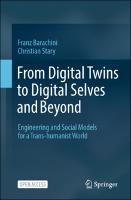From Digital Twins to Digital Selves and Beyond
Engineering and Social Models for a Trans-humanist World
Author(s)
Barachini, Franz
Stary, Christian
Language
EnglishAbstract
This open access book aims at deepening the understanding of the relation between cyber-physical systems (CPSs) as socio-technical systems and their digital representations with intertwined artificial intelligence (AI). The authors describe why it is crucial for digital selves to be able to develop emotional behavior and why a humanity-inspired AI is necessary so that humans and humanoids can coexist. The introductory chapter describes major milestones in computer science which form the basis for the implementation of digital twins and digital selves. The subsequent Part I then lays the foundation to develop a socio-technical understanding of the nature of digital twins as representations and trans-human development objects. Following the conceptual understanding of digital twins and how they could be engineered according to cognitive and organizational structures, Part II forms the groundwork for understanding social behavior and its modeling. It discusses various perception-based socio-emotional approaches before sketching behavior-relevant models and their simulation capabilities. In particular, it is shown how emotions can substantially influence the collective behavior of artificial actors. Part III eventually presents a symbiosis showing under which preconditions digital selves might construct and produce digital twins as integrated design elements in trans-human ecosystems. The chapters in this part are dedicated to opportunities and modes of co-creating reflective socio-trans-human systems based on digital twin models, exploring mutual control and continuous development. The final epilog is congenitally speculative in its nature by presenting thoughts on future developments of artificial life in computational substrates. The book is written for researchers and professionals in areas like cyber-physical systems, robotics, social simulation or systems engineering, interested to take a speculative look into the future of digital twins and autonomous agents. It also touches upon philosophical aspects of digital twins, digital selves and humanoids.
Keywords
Trans-Humanism; Digital Twins; Digital Society; Artificial Intelligence; Transformative Change; Cyber-Physical Systems; RoboticsDOI
10.1007/978-3-030-96412-2ISBN
9783030964122, 9783030964122Publisher
Springer NaturePublisher website
https://www.springernature.com/gp/products/booksPublication date and place
Cham, 2022Imprint
Springer International PublishingClassification
Digital and information technologies: social and ethical aspects
Artificial intelligence
Electrical engineering


 Download
Download Web Shop
Web Shop